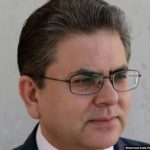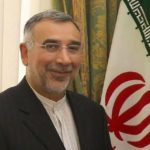Abdullah Abdullah said on Tuesday, that while there is a “peaceful future on the horizon”for Afghanistan, everyone needs to move beyond “conspiracy theories” that have held the region back and urged the stakeholders to take practical steps during the peace process.
“I believe it is now a chance to pass the old and repeated slogans and conspiracy theories that have kept us behind and create a new chapter… We need, more than ever, to see our region as a single region,” the chairman of the High Council for National Reconciliation said while addressing an event at the Institute of Strategic Studies (ISS) on the second day of his trip to Pakistan.
Abdullah said Pakistan played a key role in the start of the Afghan peace negotiations and it has to play an important role in helping to successfully bring the talks to their desired conclusion by standing beside the people and the government of Afghanistan.
“Considering the current geopolitical context of the region, many new windows of opportunities have opened up. Therefore, more than ever, both countries need to pursue an enhanced level of interaction for a more peaceful and prosperous coexistence,” Abdullah said about Afghan=Pak relations.
Abdullah said that his job in the Reconciliation Council is to help build consensus and promote reconciliation to “justly, inclusively and honourably” end the war and seek a political settlement. He pointed that Afghanistan has changed over the years, for the better.
“Afghanistan today is not the country of 1990s or early 2001. It is a young, diverse, connected nation, eager to freely decide its own future form of government, corresponding to its unity and diversity.”
He also said that Afghans do not want a terrorist footprint in their country or to allow any entity to pose a threat to any other nation.
Both Afghanistan and Pakistan continue to pay a high price because of terrorism, he said, adding that there are groups working as spoilers of the peace process.
Referring to the ongoing peace talks with the Taliban in Doha, Abdullah said they had been urged to cease the war and seize this opportunity for peace.
“These days history will be shaped. It was a good start. We have asked our delegation, President Ghani and myself, to be patient, to be ready to make compromise and to not miss any opportunity because conditions may evolve and that [failure] will haunt us.”
He thanked Pakistan for their efforts and for hosting millions of Afghan refugees over the past four decades.
“We want our immigrants to return to their country voluntarily, with dignity and with new hope.”
At the same event, Pakistan’s Foreign Minister Shah Mahmood Qureshi emphasized his country’s support for the peace negotiations and said, “A realization has evolved over the years that there is no military solution to the Afghan conflict. This voice, often not heard, has finally been heard. Today there is recognition of a negotiated political settlement is the only and best way forward.”
He said Islamabad respects Afghanistan’s decisions.
“We do not want to meddle in your [Afghanistan’s] internal affairs. We respect your sovereignty, your independence and your territorial integrity.”
He added, “Whatever consensus evolves from your dialogue and your negotiations, we as the people of Pakistan will accept the will of the people of Afghanistan… Afghans and only Afghans can determine the future of Afghanistan.”
“To bring the Taliban to the negotiating table was not easy, but it happened. Reaching an understanding was not easy, but it happened,” Qureshi said. He also assured Kabul of Pakistan’s “complete support.”
He said Pakistan’s peace was linked with Afghanistan’s peace and stability, and also of the entire region.
He said there had been “a paradigm shift” and Pakistan wants to be “friend, and not master” of Afghanistan.
He said Afghan President Ashraf Ghani will visit Pakistan soon.













